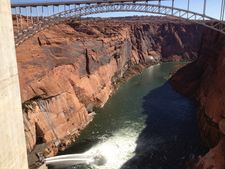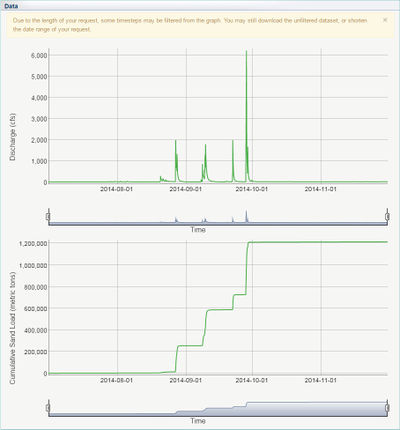Difference between revisions of "GCDAMP- HFE 2014"
From Glen Canyon Dam AMP
Cellsworth (Talk | contribs) |
Cellsworth (Talk | contribs) |
||
| Line 14: | Line 14: | ||
|birth_place = | |birth_place = | ||
}} | }} | ||
| − | |||
*Sediment in the system: '''1,195,000 metric tons''' | *Sediment in the system: '''1,195,000 metric tons''' | ||
*Peak CFS: '''~37,500''' | *Peak CFS: '''~37,500''' | ||
Revision as of 13:14, 19 October 2016
SUMMARY
| High Flow Experiment- 2014 | |
 |
- Sediment in the system: 1,195,000 metric tons
- Peak CFS: ~37,500
- Estimated costs to hydropower: $1.749 million
- Actual costs to hydropower: $2.1 million
- Estimated acre feet of water bypassed during HFE: approx. 129,000 af
- Hourly Releases before and after HFE: fluctuate between 5,000 to 8,000 cfs
- Direct expenses for removal of concession assets: $9,961
- Units available: 7
- Powerplant capacity = ~19,100 cfs
- November volume = 670 kaf
- Start Upramp: November 10, 9:00 am
- Finish HFE: November 15, 2:00 pm
- Total HFE duration: 96 hrs
- HFE 2014 represents the 3rd controlled high flow release conducted under the HFE Protocol.
SUPPORTING DOCUMENTS
- Updates on 2014 HFE, 2015 Paria sediment inputs, and sediment mass balance
- Memo from Jennifer Gimbel, Chair, Glen Canyon Leadership Team dated October 24, 2014, to Brent Rhees, Acting Regional Director, Subject: Approval of Recommendation for Experimental High-Flow Release from Glen Canyon Dam, November 2014*Fall 2014 HFE Planning and PPT
- DOI Memo: Approval of Recommendation for Experimental High-Flow release from Glen Canyon Dam, November 2014
- Planning for a Fall 2014 High Flow Experiment
- Fall 2014 HFE Planning
COMPLIANCE
- A 30-day letter was sent notifying MOA signatories of a possible HFE in October 9, 2014.
- DOI consultation meeting with the Basin States_ October 07, 2014.
- Government to Government tribal consultation: Pueblo of Zuni_
- Government to Government tribal consultation: Navajo Nation_
- Report made available and presented at AMWG_ August 27-28, 2014.
- USBR conducted a webinar with TWG, October 1th, 2014.
CONCERNS
- Pueblo of Zuni: concern that multiple HFE's under the HFE protocol could result in power cost increases for individual rate payers.
Request to USBR made for detailed description on how the economic effects of multiple HFEs on power rate payers will be monitored.
SEDIMENT
- "The quantity of sand available for this HFE is huge, and to put it in perspective, there will be more sand AFTER this HFE (about 800,000 mt) than before last year's HFE (about 650,000 mt)." [GKnowles_TWG MM_131106]

2014 Paria River discharge and cumulative sand inputs
ADDITIONAL
- GCMRC has installed digital cameras that capture 5 Images every day at 43 sandbar monitoring sites throughout Marble and Grand Canyon between Lees Ferry and Diamond Creek.
- Modified original proposal to avoid additional WAPA hydropower loss (off-peak hour sales) -- Saves $30,000
- Glen Canyon Dam will start pumping an Olympic-sized swimming pool worth of water into the Colorado River every other minute--INCORRECT--LINK
- “By sending enough water downstream to fill an Olympic-sized swimming pool every few seconds...
- the 96-hour-release will pick up enough sand from river channels to fill a building as big as a football field and as tall as the Washington Monument, all the way to the brim.”
- Lake Powell is expected to drop 2.5 feet during the course of the week. --LINK
- SVaderkooi Fact Check on swimming pool comparison: Wikipedia Swimming pool size. Assuming a depth of 2 m, a 50 m x 25 m pool equals about 88,000 cubic feet. At peak Reclamation said the release from the dam was around 34,000 cfs so an olympic-sized pool would fill in about 2.6 s. Note that the USGS gage at Lees Ferry measured peak flow at about 37,000 cfs, so a little quicker (about 2.4 s) if you use that number.
Contributor: Category: Sediment, Recreation, Water delivery




